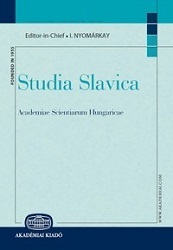Штрихи к лингвистическому портрету А. М. Пешковского в контексте научной полемики его времени
Notes to the Linguistic Portrait of A. M. Peshkovsky in the Context of Scientific Debates of his Time
Author(s): Oleg Victorovich NikitinSubject(s): Syntax, Semantics, Historical Linguistics, Eastern Slavic Languages, Interwar Period (1920 - 1939), Stylistics
Published by: Akadémiai Kiadó
Keywords: Moscow linguistic school; formal grammar; linguistic experiment; syntax; stylistics; textology; linguistic personality; ideology; methodology of linguistics; scientific debates;
Summary/Abstract: This paper reveals little-known episodes from A. Peshkovsky’s scientific biography and analyses some fragments of his books and articles in the 1920s and 1930s that became the focus of linguistic discussions and showed ambiguous ideological situation in the science of that time. Special attention is paid to the formation of A. Peshkovsky as a linguist and methodist. His first works on “school and scientific grammar” that laid the foundations of the modern approach to the study of the theory and practice of syntax are analysed. It is noted that the studies by A. Peshkovsky teetered at the level of implementing the ideas of the old Moscow linguistic school of academicians Fortunatov and Shakhmatov, while gravitating toward the insight of A. Potebnya and yet showing at the same time a different way of understanding grammatical ideas. The author claims that A. Peshkovsky went from the traditional diachronic analysis in the direction of the formal approach, while not abandoning “the psychological perception of the word”. A. Peshkovsky, a reformer taking a stand in his search and linguistic experiments against the Marrist and tunnel-visioned understanding of the tasks of Soviet linguistics and methodological science, was subjected to unfair criticism for his stance. The discussions that took place at that time testify to the consistency and scientific integrity of the scientist’s views in the era of the struggle against “eclecticism”, “formalism”, and “incorrigible Indo-Europeanism”. The paper presents some instances of correspondence disputes by V. Voloshinov and M. Bakhtin with A. Peshkovsky on the issues in relationship of grammar and stylistics. His opponents believed that “grammar detached from the semantic and stylistic side of speech inevitably degenerates into scholasticism”. Drawing on materials from archives and personal collection, the author of this paper gives unique facts of the lexicographical activity of A. Peshkovsky in the early 1920s related to his work on the explanatory dictionary of the Russian literary language (not published). The closing part of the paper analyses the dispute between L. Timofeev and A. Peshkovsky. It is stated that “the new theory of the rhythm of prose” by A. Peshkovsky and his works on psychophonetics caused an ambiguous reaction in the philological community and contributed to the activation of research seeking for a “system of division of prose into units” and other experiments on the study of literary texts. Consideration is also given to the works by A. Peshkovsky in the 1930s, in which the scientist solved new problems in the field of formal characteristics of words and word combinations, wrote about the functioning of literary speech as well as the role of intonation in the formation of the syntactic structure of the sentence. Emphasis is laid on the originality and experimental character of many theses by A. Peshkovsky further developed in the late 20th and early 21st centuries.
Journal: Studia Slavica Academiae Scientiarum Hungaricae
- Issue Year: 64/2019
- Issue No: 1
- Page Range: 131-158
- Page Count: 28
- Language: Russian
- Content File-PDF

